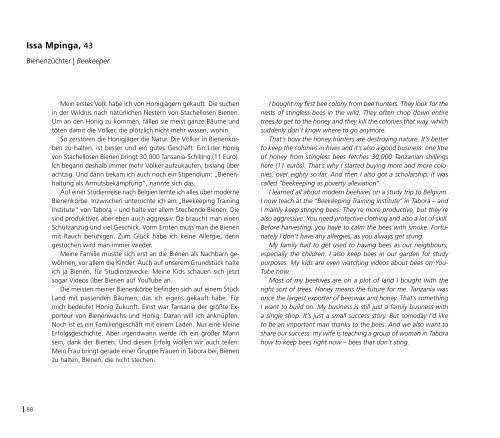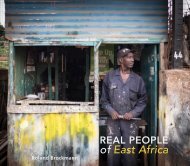Real People of East Africa. Roland Brockmann
From 2016 - 2017 I made four trips through Kenya and Tanzania - travelling over land by minibus, motorbike taxi or on foot. Not to search for something, but to meet the existing, was a great adventure. This photo & text book is about the people I met along my way. They talk about what concerns them: success, failure, love, hope... everyday life. The photos show the people in their living or working environment. And always at eye level. Comming out in december at Photo Edition Berlin. With Essays from Alexis Malefakis and Meja Mwangi. Hardcover. 24 x 21 cm, 112 Pages, 49 images. Language: German/English.
From 2016 - 2017 I made four trips through Kenya and Tanzania - travelling over land by minibus, motorbike taxi or on foot. Not to search for something, but to meet the existing, was a great adventure. This photo & text book is about the people I met along my way. They talk about what concerns them: success, failure, love, hope... everyday life. The photos show the people in their living or working environment. And always at eye level. Comming out in december at Photo Edition Berlin. With Essays from Alexis Malefakis and Meja Mwangi. Hardcover. 24 x 21 cm, 112 Pages, 49 images. Language: German/English.
You also want an ePaper? Increase the reach of your titles
YUMPU automatically turns print PDFs into web optimized ePapers that Google loves.
Issa Mpinga, 43<br />
Bienenzüchter | Beekeeper<br />
Mein erstes Volk habe ich von Honigjägern gekauft. Die suchen<br />
in der Wildnis nach natürlichen Nestern von Stachellosen Bienen.<br />
Um an den Honig zu kommen, fällen sie meist ganze Bäume und<br />
töten damit die Völker, die plötzlich nicht mehr wissen, wohin.<br />
So zerstören die Honigjäger die Natur. Die Völker in Bienenkörben<br />
zu halten, ist besser und ein gutes Geschäft: Ein Liter Honig<br />
von Stachellosen Bienen bringt 30.000 Tansania-Schilling (11 Euro).<br />
Ich begann deshalb immer mehr Völker aufzukaufen, bislang über<br />
achtzig. Und dann bekam ich auch noch ein Stipendium: „Bienenhaltung<br />
als Armutsbekämpfung“, nannte sich das.<br />
Auf einer Studienreise nach Belgien lernte ich alles über moderne<br />
Bienenkörbe. Inzwischen unterrichte ich am „Beekeeping Training<br />
Institute“ von Tabora – und halte vor allem Stechende Bienen. Die<br />
sind produktiver, aber eben auch aggressiv. Da braucht man einen<br />
Schutzanzug und viel Geschick. Vorm Ernten muss man die Bienen<br />
mit Rauch beruhigen. Zum Glück habe ich keine Allergie, denn<br />
gestochen wird man immer wieder.<br />
Meine Familie musste sich erst an die Bienen als Nachbarn gewöhnen,<br />
vor allem die Kinder. Auch auf unserem Grundstück halte<br />
ich ja Bienen, für Studienzwecke. Meine Kids schauen sich jetzt<br />
sogar Videos über Bienen auf YouTube an.<br />
Die meisten meiner Bienenkörbe befinden sich auf einem Stück<br />
Land mit passenden Bäumen, das ich eigens gekauft habe. Für<br />
mich bedeutet Honig Zukunft. Einst war Tansania der größte Exporteur<br />
von Bienenwachs und Honig. Daran will ich anknüpfen.<br />
Noch ist es ein Familiengeschäft mit einem Laden. Nur eine kleine<br />
Erfolgsgeschichte. Aber irgendwann werde ich ein großer Mann<br />
sein, dank der Bienen. Und diesen Erfolg wollen wir auch teilen:<br />
Mein Frau bringt gerade einer Gruppe Frauen in Tabora bei, Bienen<br />
zu halten, Bienen, die nicht stechen.<br />
I bought my first bee colony from bee hunters. They look for the<br />
nests <strong>of</strong> stingless bees in the wild. They <strong>of</strong>ten chop down entire<br />
trees to get to the honey and they kill the colonies that way, which<br />
suddenly don’t know where to go anymore.<br />
That’s how the honey hunters are destroying nature. It’s better<br />
to keep the colonies in hives and it’s also a good business: one litre<br />
<strong>of</strong> honey from stingless bees fetches 30,000 Tanzanian shillings<br />
here (11 euros). That’s why I started buying more and more colonies,<br />
over eighty so far. And then I also got a scholarship; it was<br />
called “beekeeping as poverty alleviation”.<br />
I learned all about modern beehives on a study trip to Belgium.<br />
I now teach at the “Beekeeping Training Institute” in Tabora – and<br />
I mainly keep stinging bees. They’re more productive, but they’re<br />
also aggressive. You need protective clothing and also a lot <strong>of</strong> skill.<br />
Before harvesting, you have to calm the bees with smoke. Fortunately<br />
I don’t have any allergies, as you always get stung.<br />
My family had to get used to having bees as our neighbours,<br />
especially the children. I also keep bees in our garden for study<br />
purposes. My kids are even watching videos about bees on You-<br />
Tube now.<br />
Most <strong>of</strong> my beehives are on a plot <strong>of</strong> land I bought with the<br />
right sort <strong>of</strong> trees. Honey means the future for me. Tanzania was<br />
once the largest exporter <strong>of</strong> beeswax and honey. That’s something<br />
I want to build on. My business is still just a family business with<br />
a single shop. It’s just a small success story. But someday I’d like<br />
to be an important man thanks to the bees. And we also want to<br />
share our success: my wife is teaching a group <strong>of</strong> woman in Tabora<br />
how to keep bees right now – bees that don’t sting.<br />
88




